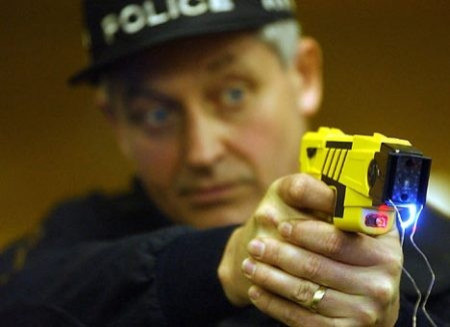Taser Guns Can Cause Heart Attacks, Study Says

The shock from a Taser can cause cardiac arrest and kill you, according a new study published by the American Medical Association. Researchers analyzed records of eight people who went into cardiac arrest after being shocked with a Taser, seven of whom died, and concluded that the purportedly non-lethal weapon is anything but.
Tasers are a brand of electroshock weapons used by more than 16,000 law enforcement agencies in over 100 countries. The weapon uses electrical currents to disrupt muscle control from a distance, subduing the person without the need for a physical confrontation.
Taser maintains that its products are safe, but between 2000 and 2006, Tasers 160 people died after having a Taser used on them, according to the U.S. Justice Department.
Tasers fire barbs that attach to clothes and skin, sending an electric shock through the body which can cause irregular heartbeat and cardiac arrest, a condition in which the heart cannot properly contract according to the study. It is the first scientific, peer-reviewed study to find evidence that Tasers can cause cardiac arrest.
Tasers can cause heart rates to speed up to deadly levels, according to ABC News. Pigs that were zapped with a Taser saw their heartbeats jump to a dangerous 130 beats per minute, almost double the normal rate of 70 beats per minute.
It is absolutely unequivocal based on my understanding of how electricity works on the heart, based on good animal data and based on numerous clinical situations that the Taser unquestionably can produce sudden cardiac arrest and death, Dr. Zipes, author of the study published on Monday in the journal Circulation and cardiologist at Indiana University, told WCPO, Cincinnati's ABC affiliate.
Tasers have been linked to three deaths so far in 2012. In March, 37-year-old James Clifton Barnes was arrested in Florida for an undisclosed reason and was struggling with police while in handcuffs when an officer used a Taser on him. He stopped breathing and was taken to a hospital, where he died a few days later.
Also in March, Roberto Laudisio Curti, a 21-year-old student suspected of stealing from a convenience store, died in Australia after police used a Taser to stop him from running away.
In April, a pornographic actor named Marland Anderson went into a coma after police shot him with a Taser gun twice. He died five days later.
Despite the numerous deaths, the U.S. Justice Department maintains the device is safe and effective, since 99.7 percent of incidences where a Taser is used result in either no injuries at all, or minor injuries such as scrapes or bruises.
In the cases where people who were shot with a Taser died, it was often due to improper use of the device, the Justice Department said in a report.
A review of deaths following [Taser] exposure found that many are associated with continuous or repeated shocks, the report says. There may be circumstances in which repeated or continuous exposure is required, but law enforcement officers should be aware that the associated risks are unknown. Therefore, caution is urged in using multiple activations.
The deaths could also be due to underlying health conditions, the report said. Dr. Corey Slovis, professor and chairman of emergency medicine at Vanderbilt University, told ABC News that many police officers do not anticipate that suspects may have an underlying condition, which can be dangerous,
I think that Tasers in normal subjects are safe. I am concerned that emerging evidence may show that they may change the underlying heart rhythm of individuals who do not have a normal conduction system -- such as those using cocaine, those who are dehydrated, agitated, hypoxic or those taking anti-psychotics.
Previous studies have also shown Tasers to be safe, with little chance of injury.
Research with police officers shows only minor injuries, such as those related to muscle contractions, no electrical injuries and one vertebral injury, Dr. Gary Vilke, professor of clinical medicine at the University of California at San Diego, told ABC News.
Steve Tuttle, a spokesman for Taser, told the New York Times that Tasers are safer than firearms and accused Zipes, who has served as an expert witness in lawsuits against Taser, of having a grudge against the device.
Clearly, Dr. Zipes has a strong financial bias based on his career as an expert witness, which might help explain why he disagrees with the findings of independent medical examiners with no pecuniary interest in these cases as well as the U.S. Department of Justice, he said.
However, while studies may show that Tasers are safe, some researchers are worried that the device can be dangerous in people with underlying conditions, which may not be taken into account by police.
Zipes said he isn't condemning Tasers, but simply asking police officers to use restraint. Dr. Robert J. Myerburg, a professor of medicine at the University of Miami, echoed Zipes, telling the New York Times that Tasers should be used judiciously.
I'd rather see Tasers out there than bullets flying around, he said. But if you have a choice, if the circumstances allow you to avoid either, then physical restraint should be considered.
© Copyright IBTimes 2025. All rights reserved.





















